Australia’s Bi-Lateral Relationship with China
VerifiedAdded on 2023/04/23
|7
|1570
|71
AI Summary
This report outlines the economic, strategic and diplomatic relationship shared between Australia and China over the years, with special reference to economic ties. The paper argues that Australia enjoys a balanced and harmonious bi-lateral relationship and concludes by stating that Australia should continue to work on this strategic relationship in order for both countries to be benefit from such a relationship in the long run.
Contribute Materials
Your contribution can guide someone’s learning journey. Share your
documents today.
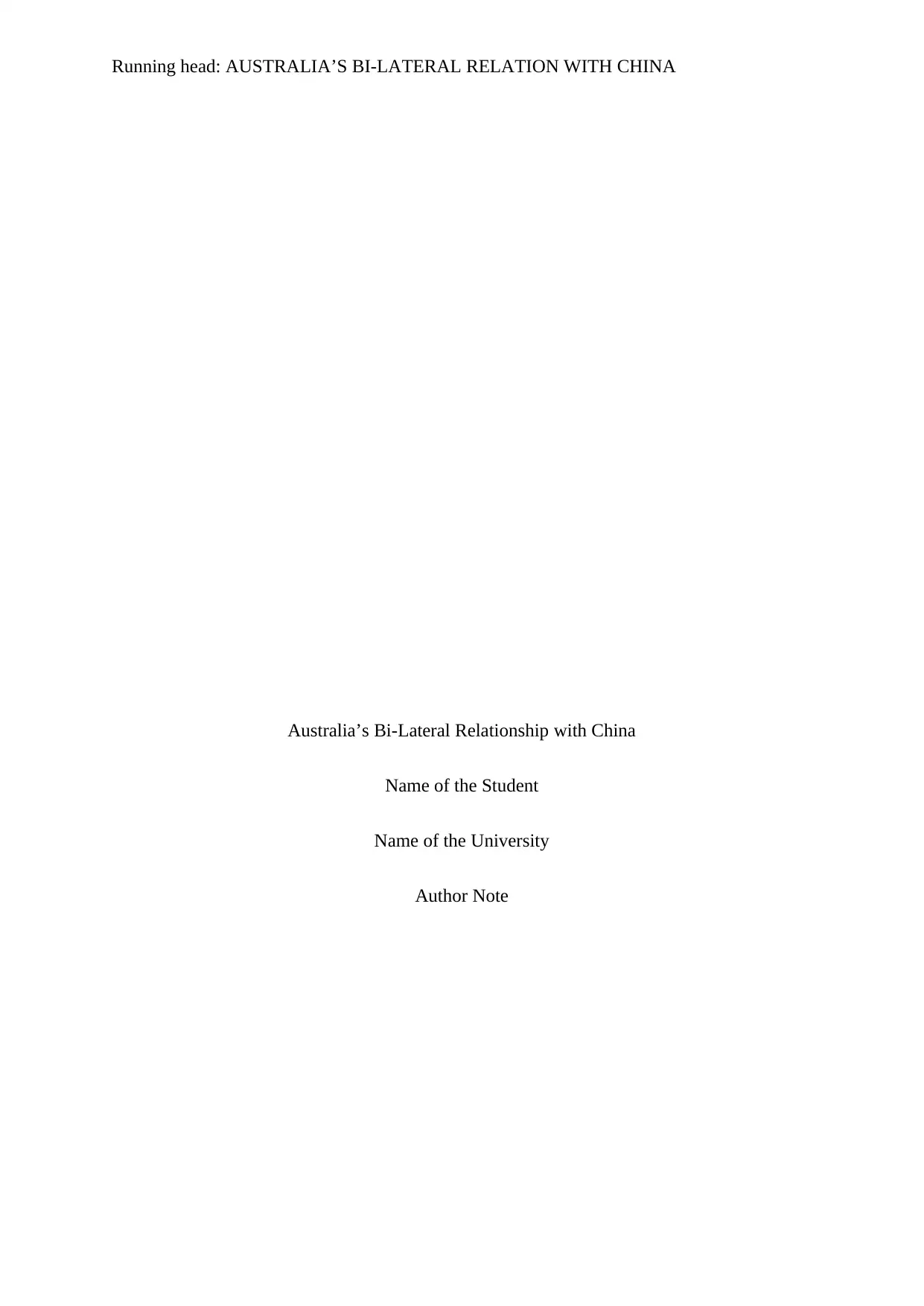
Running head: AUSTRALIA’S BI-LATERAL RELATION WITH CHINA
Australia’s Bi-Lateral Relationship with China
Name of the Student
Name of the University
Author Note
Australia’s Bi-Lateral Relationship with China
Name of the Student
Name of the University
Author Note
Secure Best Marks with AI Grader
Need help grading? Try our AI Grader for instant feedback on your assignments.
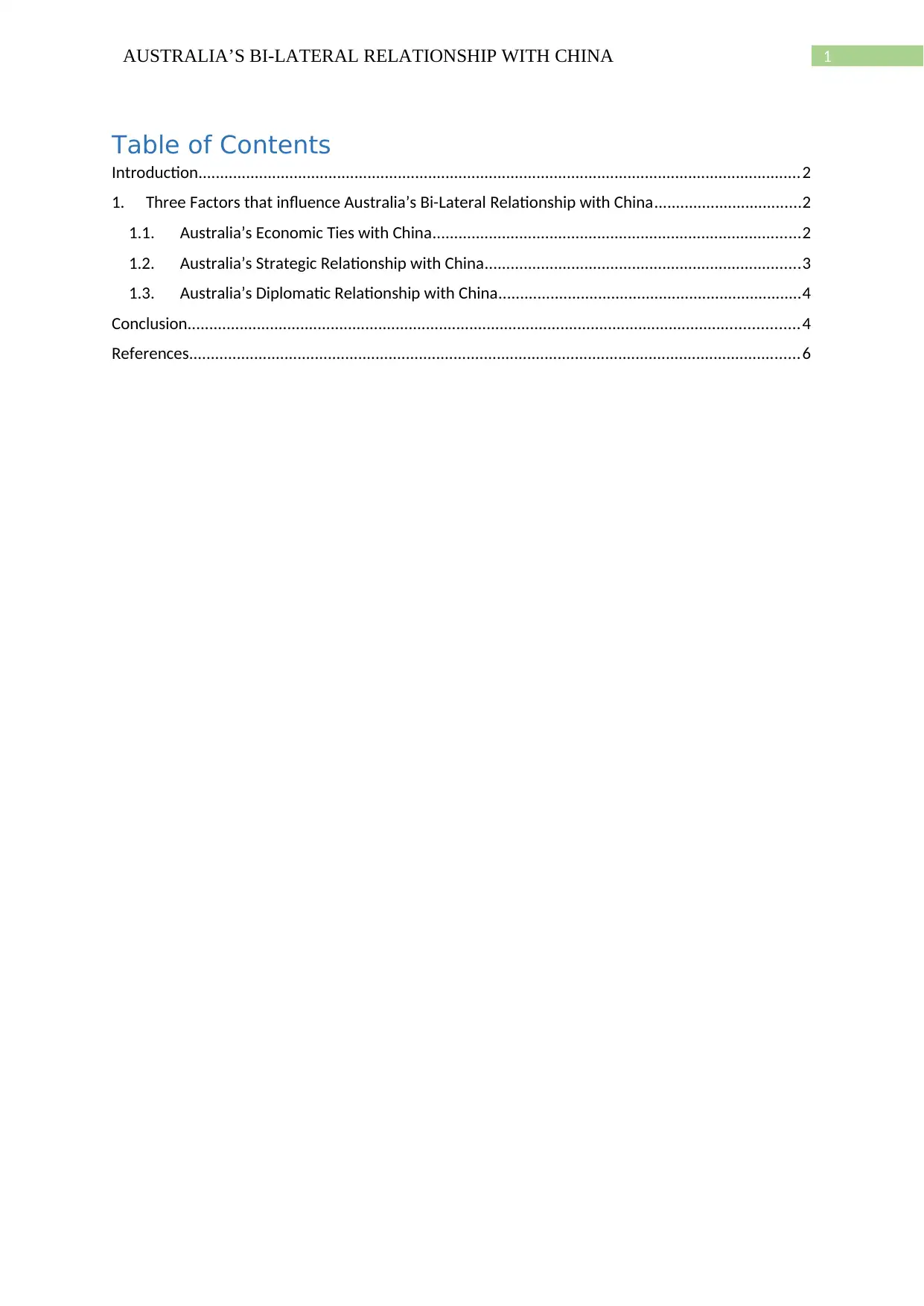
1AUSTRALIA’S BI-LATERAL RELATIONSHIP WITH CHINA
Table of Contents
Introduction...........................................................................................................................................2
1. Three Factors that influence Australia’s Bi-Lateral Relationship with China..................................2
1.1. Australia’s Economic Ties with China.....................................................................................2
1.2. Australia’s Strategic Relationship with China.........................................................................3
1.3. Australia’s Diplomatic Relationship with China......................................................................4
Conclusion.............................................................................................................................................4
References.............................................................................................................................................6
Table of Contents
Introduction...........................................................................................................................................2
1. Three Factors that influence Australia’s Bi-Lateral Relationship with China..................................2
1.1. Australia’s Economic Ties with China.....................................................................................2
1.2. Australia’s Strategic Relationship with China.........................................................................3
1.3. Australia’s Diplomatic Relationship with China......................................................................4
Conclusion.............................................................................................................................................4
References.............................................................................................................................................6
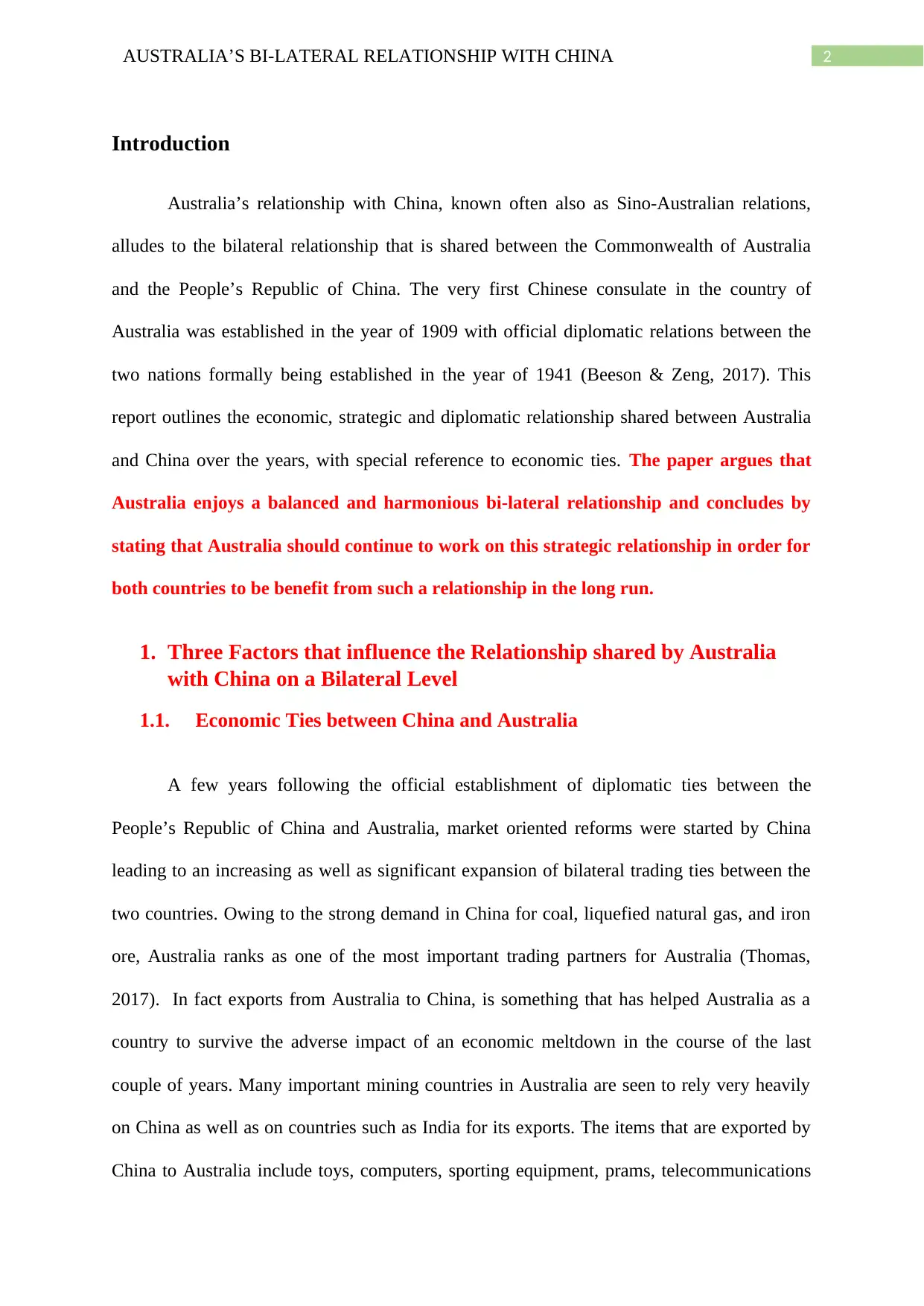
2AUSTRALIA’S BI-LATERAL RELATIONSHIP WITH CHINA
Introduction
Australia’s relationship with China, known often also as Sino-Australian relations,
alludes to the bilateral relationship that is shared between the Commonwealth of Australia
and the People’s Republic of China. The very first Chinese consulate in the country of
Australia was established in the year of 1909 with official diplomatic relations between the
two nations formally being established in the year of 1941 (Beeson & Zeng, 2017). This
report outlines the economic, strategic and diplomatic relationship shared between Australia
and China over the years, with special reference to economic ties. The paper argues that
Australia enjoys a balanced and harmonious bi-lateral relationship and concludes by
stating that Australia should continue to work on this strategic relationship in order for
both countries to be benefit from such a relationship in the long run.
1. Three Factors that influence the Relationship shared by Australia
with China on a Bilateral Level
1.1. Economic Ties between China and Australia
A few years following the official establishment of diplomatic ties between the
People’s Republic of China and Australia, market oriented reforms were started by China
leading to an increasing as well as significant expansion of bilateral trading ties between the
two countries. Owing to the strong demand in China for coal, liquefied natural gas, and iron
ore, Australia ranks as one of the most important trading partners for Australia (Thomas,
2017). In fact exports from Australia to China, is something that has helped Australia as a
country to survive the adverse impact of an economic meltdown in the course of the last
couple of years. Many important mining countries in Australia are seen to rely very heavily
on China as well as on countries such as India for its exports. The items that are exported by
China to Australia include toys, computers, sporting equipment, prams, telecommunications
Introduction
Australia’s relationship with China, known often also as Sino-Australian relations,
alludes to the bilateral relationship that is shared between the Commonwealth of Australia
and the People’s Republic of China. The very first Chinese consulate in the country of
Australia was established in the year of 1909 with official diplomatic relations between the
two nations formally being established in the year of 1941 (Beeson & Zeng, 2017). This
report outlines the economic, strategic and diplomatic relationship shared between Australia
and China over the years, with special reference to economic ties. The paper argues that
Australia enjoys a balanced and harmonious bi-lateral relationship and concludes by
stating that Australia should continue to work on this strategic relationship in order for
both countries to be benefit from such a relationship in the long run.
1. Three Factors that influence the Relationship shared by Australia
with China on a Bilateral Level
1.1. Economic Ties between China and Australia
A few years following the official establishment of diplomatic ties between the
People’s Republic of China and Australia, market oriented reforms were started by China
leading to an increasing as well as significant expansion of bilateral trading ties between the
two countries. Owing to the strong demand in China for coal, liquefied natural gas, and iron
ore, Australia ranks as one of the most important trading partners for Australia (Thomas,
2017). In fact exports from Australia to China, is something that has helped Australia as a
country to survive the adverse impact of an economic meltdown in the course of the last
couple of years. Many important mining countries in Australia are seen to rely very heavily
on China as well as on countries such as India for its exports. The items that are exported by
China to Australia include toys, computers, sporting equipment, prams, telecommunications
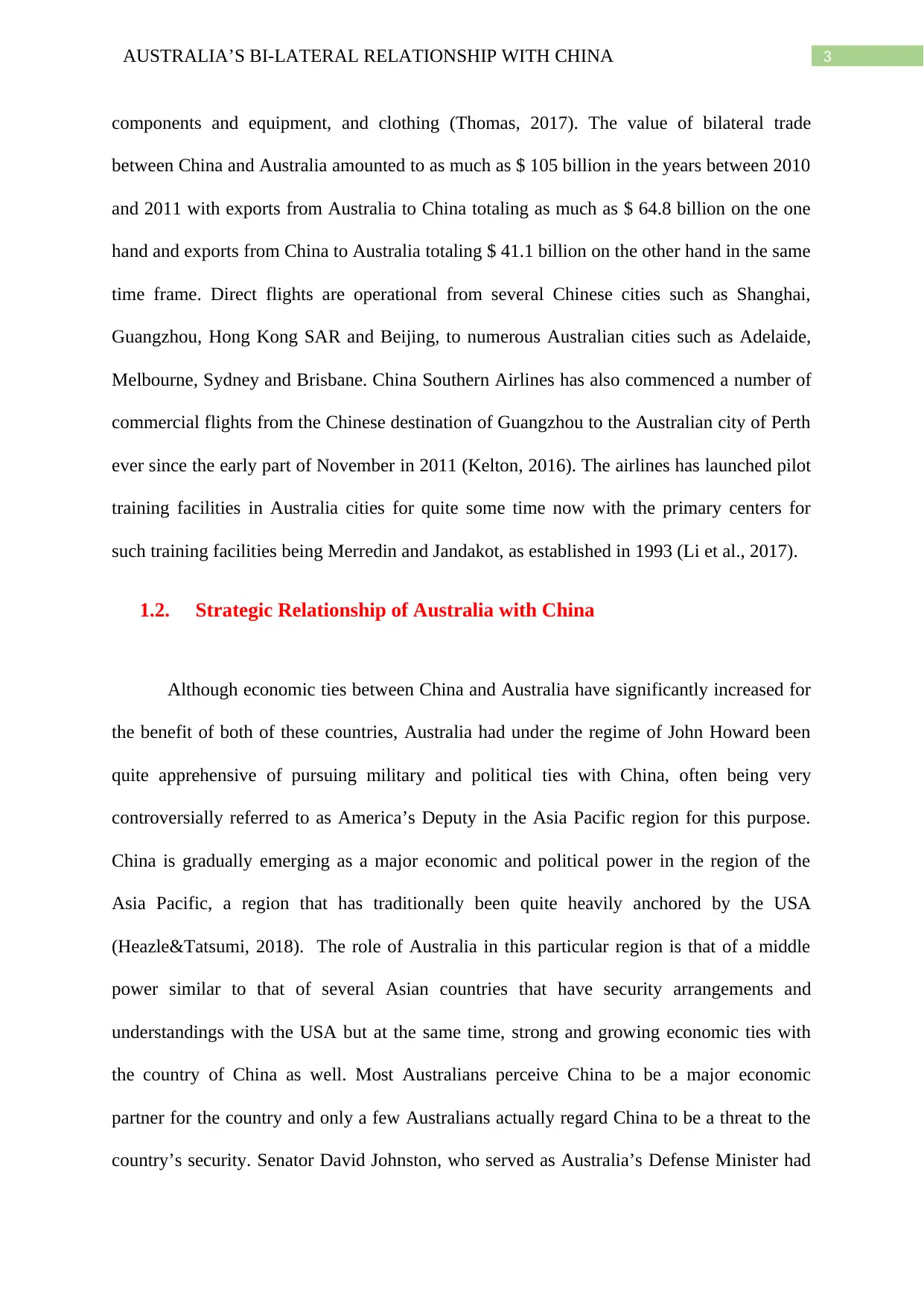
3AUSTRALIA’S BI-LATERAL RELATIONSHIP WITH CHINA
components and equipment, and clothing (Thomas, 2017). The value of bilateral trade
between China and Australia amounted to as much as $ 105 billion in the years between 2010
and 2011 with exports from Australia to China totaling as much as $ 64.8 billion on the one
hand and exports from China to Australia totaling $ 41.1 billion on the other hand in the same
time frame. Direct flights are operational from several Chinese cities such as Shanghai,
Guangzhou, Hong Kong SAR and Beijing, to numerous Australian cities such as Adelaide,
Melbourne, Sydney and Brisbane. China Southern Airlines has also commenced a number of
commercial flights from the Chinese destination of Guangzhou to the Australian city of Perth
ever since the early part of November in 2011 (Kelton, 2016). The airlines has launched pilot
training facilities in Australia cities for quite some time now with the primary centers for
such training facilities being Merredin and Jandakot, as established in 1993 (Li et al., 2017).
1.2. Strategic Relationship of Australia with China
Although economic ties between China and Australia have significantly increased for
the benefit of both of these countries, Australia had under the regime of John Howard been
quite apprehensive of pursuing military and political ties with China, often being very
controversially referred to as America’s Deputy in the Asia Pacific region for this purpose.
China is gradually emerging as a major economic and political power in the region of the
Asia Pacific, a region that has traditionally been quite heavily anchored by the USA
(Heazle&Tatsumi, 2018). The role of Australia in this particular region is that of a middle
power similar to that of several Asian countries that have security arrangements and
understandings with the USA but at the same time, strong and growing economic ties with
the country of China as well. Most Australians perceive China to be a major economic
partner for the country and only a few Australians actually regard China to be a threat to the
country’s security. Senator David Johnston, who served as Australia’s Defense Minister had
components and equipment, and clothing (Thomas, 2017). The value of bilateral trade
between China and Australia amounted to as much as $ 105 billion in the years between 2010
and 2011 with exports from Australia to China totaling as much as $ 64.8 billion on the one
hand and exports from China to Australia totaling $ 41.1 billion on the other hand in the same
time frame. Direct flights are operational from several Chinese cities such as Shanghai,
Guangzhou, Hong Kong SAR and Beijing, to numerous Australian cities such as Adelaide,
Melbourne, Sydney and Brisbane. China Southern Airlines has also commenced a number of
commercial flights from the Chinese destination of Guangzhou to the Australian city of Perth
ever since the early part of November in 2011 (Kelton, 2016). The airlines has launched pilot
training facilities in Australia cities for quite some time now with the primary centers for
such training facilities being Merredin and Jandakot, as established in 1993 (Li et al., 2017).
1.2. Strategic Relationship of Australia with China
Although economic ties between China and Australia have significantly increased for
the benefit of both of these countries, Australia had under the regime of John Howard been
quite apprehensive of pursuing military and political ties with China, often being very
controversially referred to as America’s Deputy in the Asia Pacific region for this purpose.
China is gradually emerging as a major economic and political power in the region of the
Asia Pacific, a region that has traditionally been quite heavily anchored by the USA
(Heazle&Tatsumi, 2018). The role of Australia in this particular region is that of a middle
power similar to that of several Asian countries that have security arrangements and
understandings with the USA but at the same time, strong and growing economic ties with
the country of China as well. Most Australians perceive China to be a major economic
partner for the country and only a few Australians actually regard China to be a threat to the
country’s security. Senator David Johnston, who served as Australia’s Defense Minister had
Secure Best Marks with AI Grader
Need help grading? Try our AI Grader for instant feedback on your assignments.
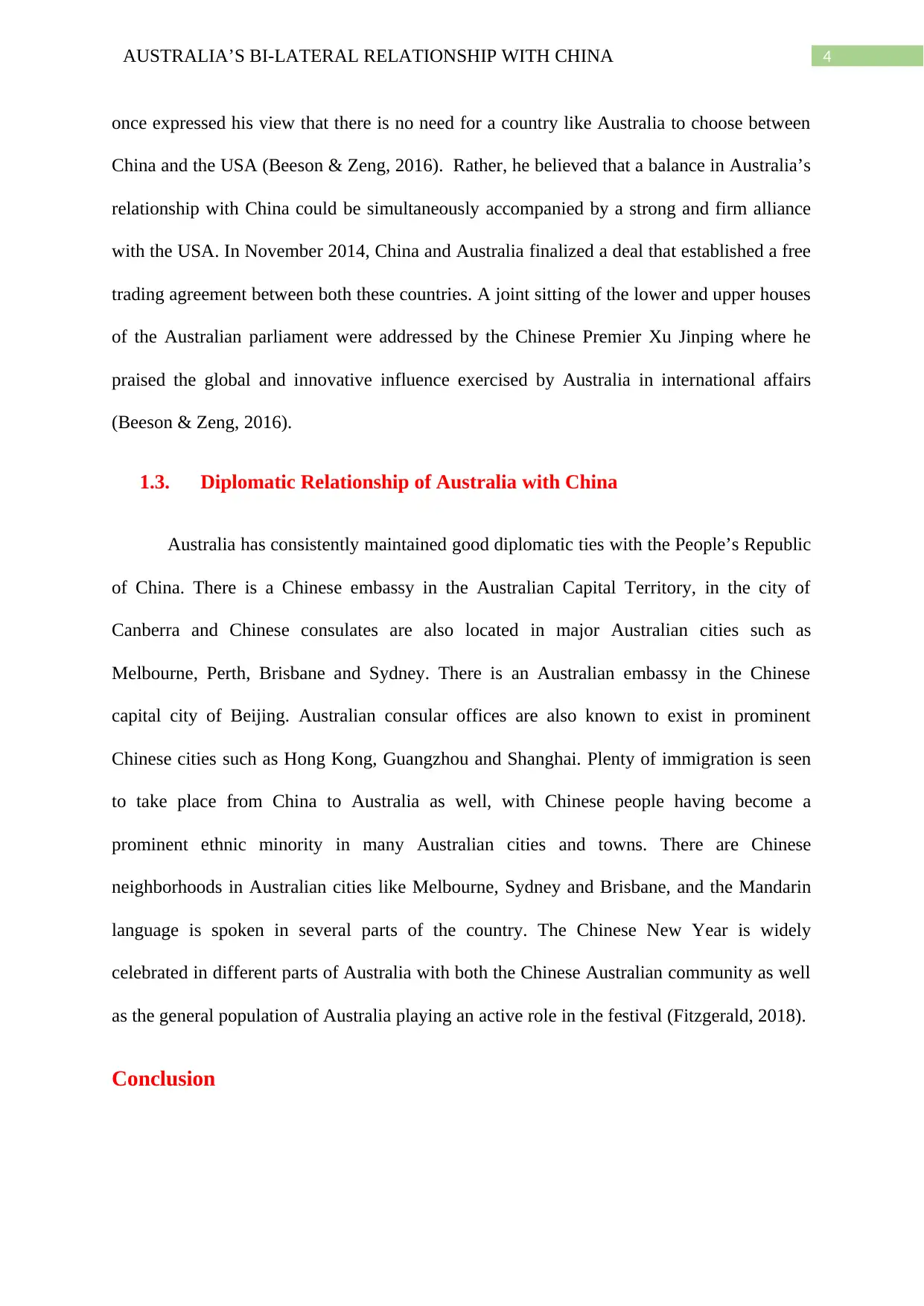
4AUSTRALIA’S BI-LATERAL RELATIONSHIP WITH CHINA
once expressed his view that there is no need for a country like Australia to choose between
China and the USA (Beeson & Zeng, 2016). Rather, he believed that a balance in Australia’s
relationship with China could be simultaneously accompanied by a strong and firm alliance
with the USA. In November 2014, China and Australia finalized a deal that established a free
trading agreement between both these countries. A joint sitting of the lower and upper houses
of the Australian parliament were addressed by the Chinese Premier Xu Jinping where he
praised the global and innovative influence exercised by Australia in international affairs
(Beeson & Zeng, 2016).
1.3. Diplomatic Relationship of Australia with China
Australia has consistently maintained good diplomatic ties with the People’s Republic
of China. There is a Chinese embassy in the Australian Capital Territory, in the city of
Canberra and Chinese consulates are also located in major Australian cities such as
Melbourne, Perth, Brisbane and Sydney. There is an Australian embassy in the Chinese
capital city of Beijing. Australian consular offices are also known to exist in prominent
Chinese cities such as Hong Kong, Guangzhou and Shanghai. Plenty of immigration is seen
to take place from China to Australia as well, with Chinese people having become a
prominent ethnic minority in many Australian cities and towns. There are Chinese
neighborhoods in Australian cities like Melbourne, Sydney and Brisbane, and the Mandarin
language is spoken in several parts of the country. The Chinese New Year is widely
celebrated in different parts of Australia with both the Chinese Australian community as well
as the general population of Australia playing an active role in the festival (Fitzgerald, 2018).
Conclusion
once expressed his view that there is no need for a country like Australia to choose between
China and the USA (Beeson & Zeng, 2016). Rather, he believed that a balance in Australia’s
relationship with China could be simultaneously accompanied by a strong and firm alliance
with the USA. In November 2014, China and Australia finalized a deal that established a free
trading agreement between both these countries. A joint sitting of the lower and upper houses
of the Australian parliament were addressed by the Chinese Premier Xu Jinping where he
praised the global and innovative influence exercised by Australia in international affairs
(Beeson & Zeng, 2016).
1.3. Diplomatic Relationship of Australia with China
Australia has consistently maintained good diplomatic ties with the People’s Republic
of China. There is a Chinese embassy in the Australian Capital Territory, in the city of
Canberra and Chinese consulates are also located in major Australian cities such as
Melbourne, Perth, Brisbane and Sydney. There is an Australian embassy in the Chinese
capital city of Beijing. Australian consular offices are also known to exist in prominent
Chinese cities such as Hong Kong, Guangzhou and Shanghai. Plenty of immigration is seen
to take place from China to Australia as well, with Chinese people having become a
prominent ethnic minority in many Australian cities and towns. There are Chinese
neighborhoods in Australian cities like Melbourne, Sydney and Brisbane, and the Mandarin
language is spoken in several parts of the country. The Chinese New Year is widely
celebrated in different parts of Australia with both the Chinese Australian community as well
as the general population of Australia playing an active role in the festival (Fitzgerald, 2018).
Conclusion
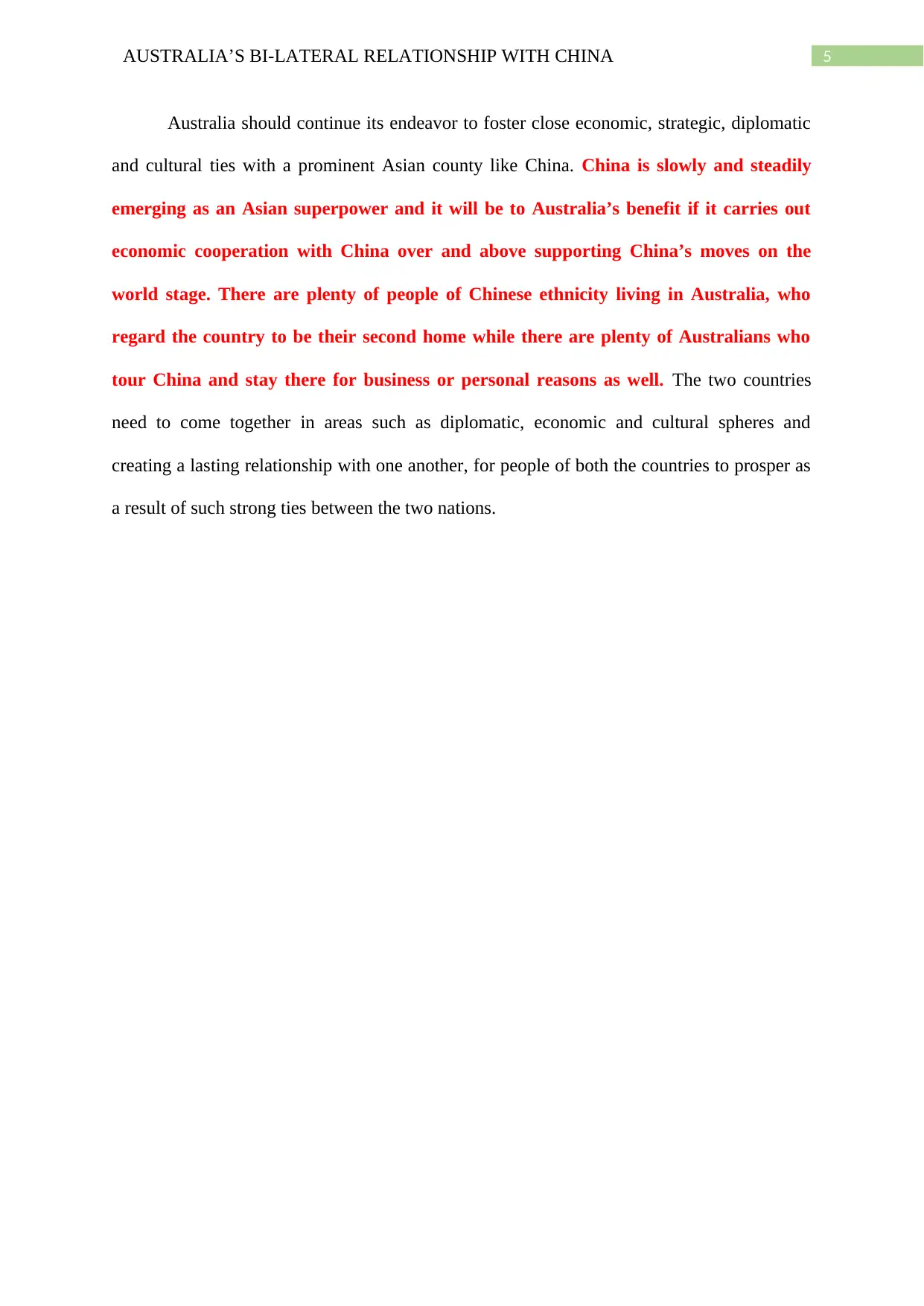
5AUSTRALIA’S BI-LATERAL RELATIONSHIP WITH CHINA
Australia should continue its endeavor to foster close economic, strategic, diplomatic
and cultural ties with a prominent Asian county like China. China is slowly and steadily
emerging as an Asian superpower and it will be to Australia’s benefit if it carries out
economic cooperation with China over and above supporting China’s moves on the
world stage. There are plenty of people of Chinese ethnicity living in Australia, who
regard the country to be their second home while there are plenty of Australians who
tour China and stay there for business or personal reasons as well. The two countries
need to come together in areas such as diplomatic, economic and cultural spheres and
creating a lasting relationship with one another, for people of both the countries to prosper as
a result of such strong ties between the two nations.
Australia should continue its endeavor to foster close economic, strategic, diplomatic
and cultural ties with a prominent Asian county like China. China is slowly and steadily
emerging as an Asian superpower and it will be to Australia’s benefit if it carries out
economic cooperation with China over and above supporting China’s moves on the
world stage. There are plenty of people of Chinese ethnicity living in Australia, who
regard the country to be their second home while there are plenty of Australians who
tour China and stay there for business or personal reasons as well. The two countries
need to come together in areas such as diplomatic, economic and cultural spheres and
creating a lasting relationship with one another, for people of both the countries to prosper as
a result of such strong ties between the two nations.
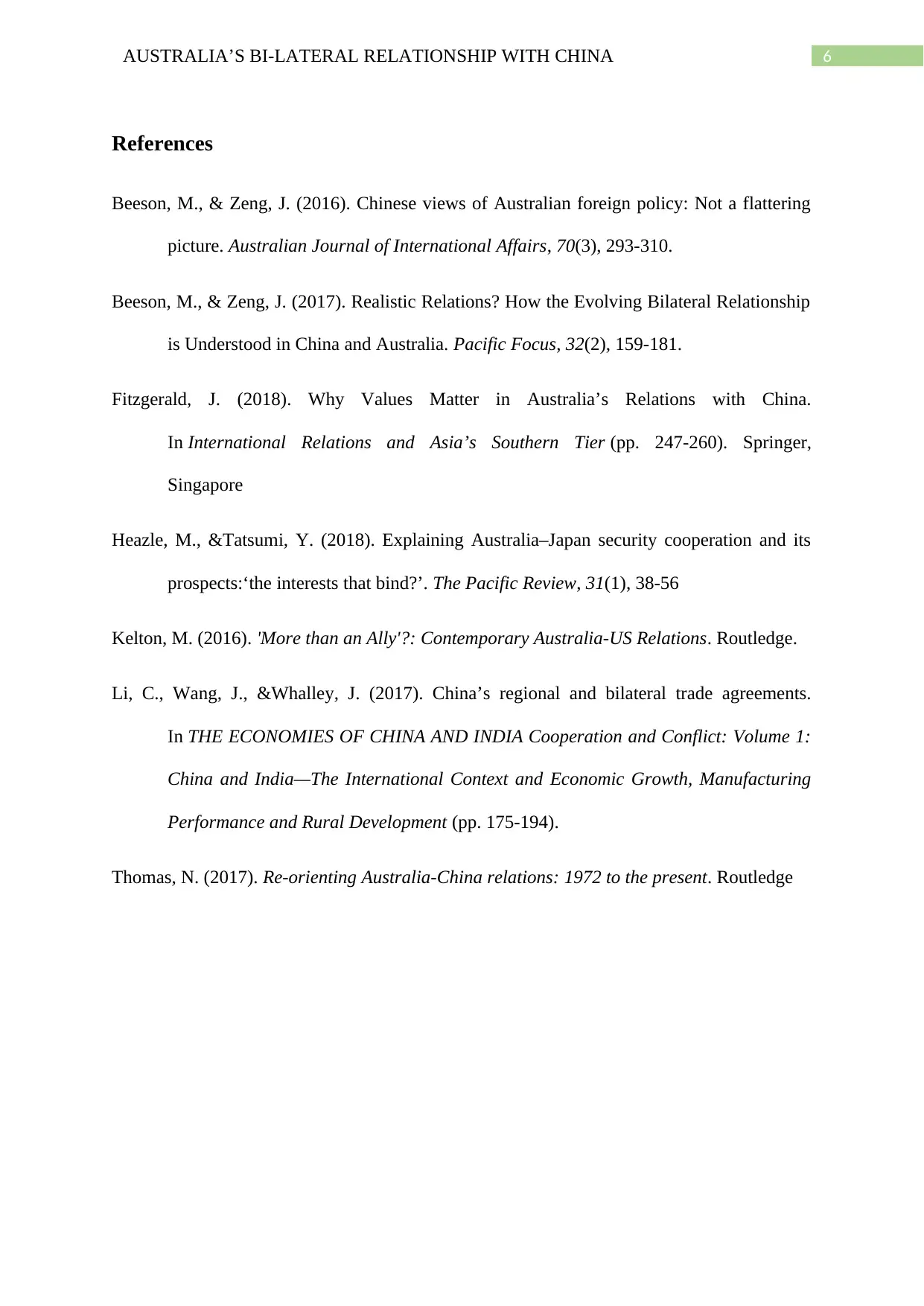
6AUSTRALIA’S BI-LATERAL RELATIONSHIP WITH CHINA
References
Beeson, M., & Zeng, J. (2016). Chinese views of Australian foreign policy: Not a flattering
picture. Australian Journal of International Affairs, 70(3), 293-310.
Beeson, M., & Zeng, J. (2017). Realistic Relations? How the Evolving Bilateral Relationship
is Understood in China and Australia. Pacific Focus, 32(2), 159-181.
Fitzgerald, J. (2018). Why Values Matter in Australia’s Relations with China.
In International Relations and Asia’s Southern Tier (pp. 247-260). Springer,
Singapore
Heazle, M., &Tatsumi, Y. (2018). Explaining Australia–Japan security cooperation and its
prospects:‘the interests that bind?’. The Pacific Review, 31(1), 38-56
Kelton, M. (2016). 'More than an Ally'?: Contemporary Australia-US Relations. Routledge.
Li, C., Wang, J., &Whalley, J. (2017). China’s regional and bilateral trade agreements.
In THE ECONOMIES OF CHINA AND INDIA Cooperation and Conflict: Volume 1:
China and India—The International Context and Economic Growth, Manufacturing
Performance and Rural Development (pp. 175-194).
Thomas, N. (2017). Re-orienting Australia-China relations: 1972 to the present. Routledge
References
Beeson, M., & Zeng, J. (2016). Chinese views of Australian foreign policy: Not a flattering
picture. Australian Journal of International Affairs, 70(3), 293-310.
Beeson, M., & Zeng, J. (2017). Realistic Relations? How the Evolving Bilateral Relationship
is Understood in China and Australia. Pacific Focus, 32(2), 159-181.
Fitzgerald, J. (2018). Why Values Matter in Australia’s Relations with China.
In International Relations and Asia’s Southern Tier (pp. 247-260). Springer,
Singapore
Heazle, M., &Tatsumi, Y. (2018). Explaining Australia–Japan security cooperation and its
prospects:‘the interests that bind?’. The Pacific Review, 31(1), 38-56
Kelton, M. (2016). 'More than an Ally'?: Contemporary Australia-US Relations. Routledge.
Li, C., Wang, J., &Whalley, J. (2017). China’s regional and bilateral trade agreements.
In THE ECONOMIES OF CHINA AND INDIA Cooperation and Conflict: Volume 1:
China and India—The International Context and Economic Growth, Manufacturing
Performance and Rural Development (pp. 175-194).
Thomas, N. (2017). Re-orienting Australia-China relations: 1972 to the present. Routledge
1 out of 7
Related Documents
Your All-in-One AI-Powered Toolkit for Academic Success.
+13062052269
info@desklib.com
Available 24*7 on WhatsApp / Email
![[object Object]](/_next/static/media/star-bottom.7253800d.svg)
Unlock your academic potential
© 2024 | Zucol Services PVT LTD | All rights reserved.





